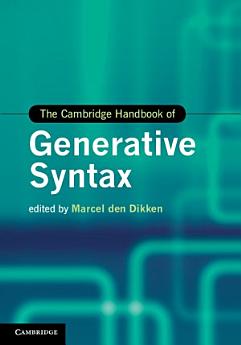The Cambridge Handbook of Generative Syntax
Marcel den Dikken
জুলাই ২০১৩ · Cambridge University Press
ইবুক
1412
পৃষ্ঠা
reportমূল্যাংকন আৰু পৰ্যালোচনা সত্যাপন কৰা হোৱা নাই অধিক জানক
এই ইবুকখনৰ বিষয়ে
Syntax – the study of sentence structure – has been at the centre of generative linguistics from its inception and has developed rapidly and in various directions. The Cambridge Handbook of Generative Syntax provides a historical context for what is happening in the field of generative syntax today, a survey of the various generative approaches to syntactic structure available in the literature and an overview of the state of the art in the principal modules of the theory and the interfaces with semantics, phonology, information structure and sentence processing, as well as linguistic variation and language acquisition. This indispensable resource for advanced students, professional linguists (generative and non-generative alike) and scholars in related fields of inquiry presents a comprehensive survey of the field of generative syntactic research in all its variety, written by leading experts and providing a proper sense of the range of syntactic theories calling themselves generative.
লিখকৰ বিষয়ে
Marcel den Dikken is a professor of linguistics at the Graduate Center of the City University of New York.
এই ইবুকখনক মূল্যাংকন কৰক
আমাক আপোনাৰ মতামত জনাওক।
পঢ়াৰ নির্দেশাৱলী
স্মাৰ্টফ’ন আৰু টেবলেট
Android আৰু iPad/iPhoneৰ বাবে Google Play Books এপটো ইনষ্টল কৰক। ই স্বয়ংক্রিয়ভাৱে আপোনাৰ একাউণ্টৰ সৈতে ছিংক হয় আৰু আপুনি য'তে নাথাকক ত'তেই কোনো অডিঅ'বুক অনলাইন বা অফলাইনত শুনিবলৈ সুবিধা দিয়ে।
লেপটপ আৰু কম্পিউটাৰ
আপুনি কম্পিউটাৰৰ ৱেব ব্রাউজাৰ ব্যৱহাৰ কৰি Google Playত কিনা অডিঅ'বুকসমূহ শুনিব পাৰে।
ই-ৰীডাৰ আৰু অন্য ডিভাইচ
Kobo eReadersৰ দৰে ই-চিয়াঁহীৰ ডিভাইচসমূহত পঢ়িবলৈ, আপুনি এটা ফাইল ডাউনল’ড কৰি সেইটো আপোনাৰ ডিভাইচলৈ স্থানান্তৰণ কৰিব লাগিব। সমৰ্থিত ই-ৰিডাৰলৈ ফাইলটো কেনেকৈ স্থানান্তৰ কৰিব জানিবলৈ সহায় কেন্দ্ৰত থকা সবিশেষ নিৰ্দেশাৱলী চাওক।






